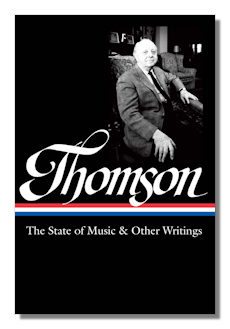
The Internet's Premier Classical Music Source
Related Links
-
Introduction
Acoustics
Ballet
Biographies
Chamber Music
Composers & Composition
Conducting
Criticism & Commentary
Discographies & CD Guides
Fiction
History
Humor
Illustrations & Photos
Instrumental
Lieder
Music Appreciation
Music Education
Music Industry
Music and the Mind
Opera
Orchestration
Reference Works
Scores
Thematic Indices
Theory & Analysis
Vocal Technique
Search Amazon
Recommended Links
Site News
 Book Review
Book Review
The State of Music and Other Writings

Virgil Thomson
Tim Page, editor
The Library of America, 2016. 1169 Pages
Lengthy chronology, notes, index
Original black and white illustrations
Permanent paper
ISBN-10: 159853467X
ISBN-13: 978-1598534672
This is the second volume of the Library of America's comprehensive collection of Virgil Thomson's writings, both edited by Tim Page, who was also the editor, with Vanessa Weeks Page of Selected Letters of Virgil Thomson (Summit Books, 1988).
The prize in this collection is the reprint of Thomson's memoirs, originally published in 1966 by Knopf as Virgil Thomson by Virgil Thomson (which for me amusingly echoes the title of his musical piece Capital Capitals). Thomson's account of Paris in the 1920s and 1930s long ago earned it a place among my favorite autobiographies, up there with those by Frank Lloyd Wright, Bertrand Russell, and Simone de Beauvoir. It includes much about Gertrude Stein and the operas Thomson created with her and produced in the U.S.
The State of Music was originally published in 1939 and revised--to bring it somewhat up to date--in 1961, leaving the original text mostly intact. In his 1961 Preface Thomson says "it is a period piece certainly, but also a historic one…" He felt that much of what he had originally said was still valid. Most of his additions are placed in brackets "and printed along with the text." His opening chapter focuses on "what it feels like to be a musician," and he follows that with chapters on painters and poets. Thomson was an economic determinist, provocatively even with respect to musical style. He has some discussion of politics and intellectual freedom. His writing style tends to be conversational and is often witty.
American Music Since 1910 was the first volume commissioned for a projected five in a Twentieth-Century Composers series. A preface by Nicolas Nabokov and two chapters by other authors are not included here. Five of the nine chapters were about Ives, Rugglea, Varese, Copland and Cage.
As the composer of operas, two with librettos by Gertrude Stein, Thomson was intensely interested in words. His Music with Words, A Composer's View, his last book, is a collection of essays about the writing of vocal music in English. It is very detailed, with uniquely practical advice and it includes musical examples. He discusses word groups, with emphasis on the most significant words, as well as long and short sounds, with particular attention to vowels and consonants. Instrumental accompaniment is also discussed, and he does not neglect emotional expression. There are two chapters on opera in the vernacular.
Thomson's "other writings" include over a hundred pages of his very substantial book reviews, mostly from the New York Review of Books. They are very much worth reading, even long after publication. Other essays include two more on opera, and two on music criticism. His early teacher in Paris, Nadia Boulanger, was remembered in "Nadia Boulanger at Seventy-Five" from the New York Times Sunday Magazine, February 4, 1962.
Copyright © 2017, R. James Tobin


















